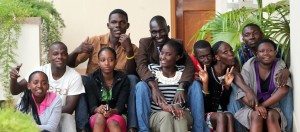The director of a newspaper in Beira, Mozambique’s second largest city, told me that he wanted health stories on all topics except HIV.
“We’ve done enough, our readers don’t want anymore, and besides, AIDS is not a problem anymore. [...]]]>
The director of a newspaper in Beira, Mozambique’s second largest city, told me that he wanted health stories on all topics except HIV.
“We’ve done enough, our readers don’t want anymore, and besides, AIDS is not a problem anymore. There is treatment now, so it’s a matter of personal responsibility not to get infected,” he said.
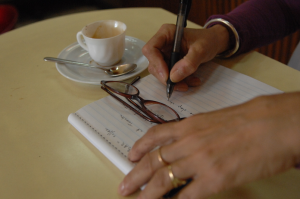
Is there something new to say about AIDS? The editor of Countdown to Zero reflects on 15 months of reporting on HIV and AIDS in Africa. Credit: M. Sayagues
I understood where he was coming from. He, his reporters and their readers had had enough of the standard AIDS stories:
• provincial and national press releases with numbers of people newly diagnosed or on treatment
• portraits extolling the heroic grannies and the poor orphans
• feature stories blaming the sex workers and truckers along the Beira corridor and the Mozambican miners bringing back hard-earned monies and the virus from South Africa.
So, when in September 2013 IPS asked me to be the editor of Countdown to Zero, I said yes to the chance to tell different AIDS stories.
We had many assets to help us in this journey: The IPS network of African correspondents in hard-hit countries, the help of our partners, UNICEF, UNAIDS and UNFPA, to connect reporters with experts across the continent and to prod the experts to be interviewed, and tips from experts about cutting-edge issues, news and angles.
And so we sailed, originally for one year, extended to 15 months. More than 30 stories and 30 blogs later, I can reflect on my experience as editor.
I train journalists across Africa on health and gender reporting, so I enjoyed Countdown’s on-the-job training component.
Since few of our journalists are specialized health reporters, this meant guiding them along the maze of statistics and jargon, without drowning in facts and keeping the structure of the stories tight and clear.
Open hearts
The most rewarding, though also the hardest, was managing the blog.
These amazing bloggers opened their hearts and their lives to me, beyond what was published.
None was a professional writer but they all had things to say, and it was through our collaborative effort that it was well said.
Yesterday I heard Oliver Mtukudzi sing, under the shadow of Cape Town’s Table Mountain: “It’s not about what we have achieved but what we have overcome.”
I thought about our bloggers’ dramatic stories and how they had overcome adversity and stigma to become beacons of hope and role models to others.
Thank you, Countdown bloggers, for allowing me and my nosy questions into your lives and for sharing your journey with our readers.
New website
I monitored the reprints in Portuguese in Mozambique. The results were impressive; we reached a varied readership. The popular free weekly Verdade(readership 100,000) gave full pages to many of our stories.
Women in Law in Southern Africa/Mozambique reposted in its Portuguese and English websites our stories on cervical cancer and on young women’s shockingly high rates of HIV infection across Africa. The network of NGOs for sexual and reproductive rights and health circulated our Mozambican stories.
In the last three months we went for multimedia, producing packages with infographics, audio soundslides and videos. This was the best part. We developed a spiffy new website to host our packages and they look awesome. Check it out here.
We did a series of stories on the daily struggles of children and youth living with HIV, the forgotten contraceptive needs of women with HIV, and the tragedy of AIDS becoming the leading cause of deaths among African teenagers.
We covered the scaling-up of Option B+, the demand for cheap and fast viral load testing, teenage pregnancy and HIV, how ideas of manhood impact on men’s behaviour around HIV, male circumcision, AIDS in South Sudan and Nigeria, and the complexities of breastfeeding and marriage for Swazi women living with HIV, and more!
So, if I were to talk today to the newspaper director, I would show him the Countdown collection of stories and say:
“Yes, we can write fresh stories on plenty of new topics around HIV and AIDS, and they are as relevant today as during the sad days before treatment. HIV is a central part of Africa’s health challenges and Countdown has been at the frontline of reporting for 15 months.”
 Over 22 years in Africa,
Over 22 years in Africa,
Mercedes Sayagues has survived stepping barefoot on a scorpion in the Kalahari, being taken hostage by Unita during Angola’s civil war, and expulsion from Robert Mugabe’s Zimbabwe for reporting human rights abuses. See her recent work as a journalist, editor and media trainer on health and gender at: http://msayagues.wix.com/mywork
Despite my serious effort to warn this dude, he said he loved me. He said he was ready; that he will trust God for whatever may happen.
So we have a wedding date! He proposed last week!

Our blogger worries that a new law in Uganda will make life, love and marriage more difficult for those with HIV. Credit: Amy Quinn/WikiCommons
Like every girl in reciprocated love, I am having a full blast of it: to have someone who cares, who looks after you, who tells you the sweet words that make you feel the one and only and best creation on earth ….. You know the feelings, how love and companionship sweeten our lives.
HIV demands some planning
Last week we registered at my clinic in Kampala, Uganda’s capital, as a discordant couple. This means one person is HIV positive and one is HIV negative.
This is important because he will get counseling, routine check-ups, and perhaps Pre Exposure Prophylaxis when we want to have babies.
An HIV positive person who follows ARV treatment consistently becomes non-infectious. Viral load becomes undetectable. So I must take my ARVs without fail every day to sustain a discordant relationship. You bet I do!
My boyfriend, who turned 28 this week (I will be 29 in January), and who lives in the same neighbourhood (this is how we met), told his family that he is marrying an HIV positive woman. Some family members objected, but he was strong, and we are planning our wedding and to live happily ever after.
For many girls living with HIV, even finding a fellow HIV positive man to date is hard. Women may suffer from self stigma and low self-esteem; they may fear disclosing their HIV status to a possible partner. Or they disclose, and the men fail them, they run away.
Another kind of failure
This year, our government failed us big time. It passed the anti HIV/AIDS bill, which has some really bad clauses for those of us living with HIV.
Concentrating on Clause 4: a person who knowingly transmits HIV to another shall on conviction be liable to a fine of up to US$ 1,900 (a fortune in Uganda) or imprisonment for up to ten years, or both.
Clause 4 means well in trying to penalize intentional infections. However, not everyone who infects someone intended to do so. My baby girl was infected during breastfeeding. I did not do that on purpose. I was too poor to afford baby formula. Does that make me a criminal?
How can you prove intention to infect? Or who was infected first? This law lends itself to malicious use, to manipulation and blackmail. It can be used by angry husbands and relatives to disposes wives and widows of land, home and children.
Clause 4 brings insecurity. It deepens stigma and mistrust and may lead to risky behavior. Women are not going to start telling guys they are dating that they have HIV. They may choose one night stands and multiple partners to avoid being identified, blamed and charged.
To me, the bill is saying that positive people must only marry positive people. Is it the role of the state to control love?
What is wrong with our lawmakers that they approve a law that makes us wary and ashamed of our condition, that does not help us embrace life with a healthy attitude?
I hear young people say they would rather not know their HIV status, instead of knowing and running the risk of being criminalized later.
Sadly, I have to conclude that our leaders are ignorant. As a nation, we have a lot of sensitization to do for both our communities and leaders.
In the meantime, wedding bells are ringing for us. We are blessed; we are lucky. But with this new Bill, many people living with HIV will despair of ever finding love and building a family.
 Barbara Kemigisa is an HIV/family planning campaigner who lives positively with HIV in Uganda. When she is not campaigning, she dabbles in fashion design, plays guitar, composes and sings R&B songs about living with HIV with the same passion she puts in her work towards zero new infections.
Barbara Kemigisa is an HIV/family planning campaigner who lives positively with HIV in Uganda. When she is not campaigning, she dabbles in fashion design, plays guitar, composes and sings R&B songs about living with HIV with the same passion she puts in her work towards zero new infections.
My first story for Countdown to Zero, back in 2013, was on paediatric HIV and I felt up to the task.
In fact, I was ready to file the story that same day. After all, this was not my first story on HIV, I had done many before. And no one had [...]]]>
My first story for Countdown to Zero, back in 2013, was on paediatric HIV and I felt up to the task.
In fact, I was ready to file the story that same day. After all, this was not my first story on HIV, I had done many before. And no one had ever burnt my effigy.
But I had not worked with Mercedes Sayagues, the Countdown editor. She wanted me to think outside the box. Very difficult.
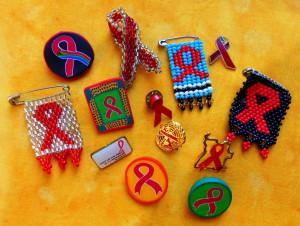
As Countdown to Zero winds down, Nairobi-based journalist Joyce Chimbi reflects on what 15 months of reporting on HIV and AIDS have meant for her. Credit: M. Sayagues/IPS
After 30 years of HIV/AIDS reporting in Africa, what could I tell that hadn’t been told before?
I did not know then that this story would set me up on a journey of ten stories, and in each one of them, I would be surprised at how little I knew about the new developments in HIV.
I was even more surprised at the attention that the stories were receiving from readers as well as other media outlets that reprinted and rerun my stories.
There is a perception that the media and the public are saturated with HIV/AIDS information, possibly because there is too much focus on what has gone wrong.
The failed vaccines. The startling new infections. The need for viral load testing. The deaths.
But there is much more than that. Stories of people who are rising above the challenge. Countries adopting new and better HIV guidelines. Cutting-edge technologies.
Each story was unique and close to my heart because in each you could hear the voice of many Kenyans and many Africans affected or infected with HIV. And you could also see their faces.
Researching and writing
I researched extensively on every story and got a lot of help along the way. Zenawit Melesse, of UNAIDS, linked me up with experts across the region who were eager to talk to me.
Researching was hard work but rewarding. I loved researching on young women bearing the brunt of HIV, and on viral load testing as the gold standard in treatment.
As a reporter, I had attended many support groups for people living with HIV, who were always happy to share their CD4 count – the higher, the better.
Yet many were still sickly. They had been on drugs for years but had never had a viral load test, which catches people who are failing on treatment before they develop drug resistance.
Countdown introduced new angles but that was half of it. New angles demanded a new style of writing. The stories had to be punchy.
Yet I still told them the same way I had told them before, same narrative, same flow, same structure, because I didn’t know any better. The editor worked tirelessly with me and, with time, I caught on.
Mercedes is well informed on HIV/AIDS, and strict with accuracy. I could not sneak in an ambiguous sentence without her demanding that I either attribute it or back with statistics. That was hard. She doesn’t compromise on statistics or quality.
Working with Countdown pushed me to do much more than I thought I had the capacity to, and while at it, I have learnt to clarify, attribute and qualify every statement in the story.
You know how people say that there are more women than men on treatment, but you have no idea when or where that conclusion was arrived at or what it implies?
It happened to me several times with Countdown stories, until I learnt to first find out who came up with the statistics, how credible they are and to seek the most recent statistics. At times, it was very frustrating.
This process has had a great impact on how I report on other topics too. My stories have become more comprehensive and well researched.
Fifteen months of Countdown, and I still feel we have just scratched the surface.
HIV/AIDS is still a serious health challenge for humankind, especially for Africa. There is need for and a lot of room for more stories about how we are tackling it.
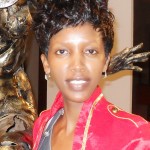 Joyce Chimbi is a Kenya-based jack of all trades reporter. HIV/AIDS is her primary focus and, when not reporting on it, she is tracking down economists, climate change experts, educationists, activists, demonstrators ….basically, if you have an opinion on something, she is probably looking for you too!
Joyce Chimbi is a Kenya-based jack of all trades reporter. HIV/AIDS is her primary focus and, when not reporting on it, she is tracking down economists, climate change experts, educationists, activists, demonstrators ….basically, if you have an opinion on something, she is probably looking for you too!
The intriguingly titled RESPECT study (Rewarding Sexually Transmitted Infection [...]]]>
The intriguingly titled RESPECT study (Rewarding Sexually Transmitted Infection Prevention and Control in Tanzania) has been described in a World Bank working paper as creating significant reduction in STIs in one of the intervention groups.
Participants received US$20 every four months if they tested negative for STIs.
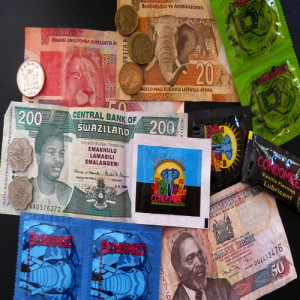
Do conditional cash transfers to change sexual behaviour and prevent HIV work, or do they actually commodify sex and health, presuming that young people will not adopt healthy behaviour unless they get an economic reward?
Credit: Mercedes Sayagues
The effects were stronger among lower socioeconomic and “higher risk” groups, that is, those who had an STI at the start of the research. The cash transfer had an equal protective effect for males and females at the end of the study. However, a survey of participants one year later showed a sustained effect among males only.
Some interesting aspects of the findings:
– The researchers wondered if the cash transfers for females worked in the short term not because they changed something intrinsic to the person, but because they protected against transactional sex on an immediate day to day basis
– Self reported changes in sexual behaviour were not consistent with STI prevalence, suggesting self report is unreliable in measuring change
– STI treatment-seeking behaviours did not change, suggesting that money influences some aspects of behaviour but not others.
Complex dynamics at play
All of this starts to paint a complex and interesting picture. The researchers suggest a number of overlapping factors could be at play.
“Price effects” essentially influence a participant to weigh the “price” of risky sex as they could lose cash if they tested STI positive.
But this can itself be affected by the fact that getting an STI from unprotected sex is not automatic; a lot depends on the risk profile of one’s sexual partners. As a result, this “price” calculation is an ongoing balancing act, with unpredictable outcomes.
“Income effects”, a weighing up of benefit as opposed to cost, might account for some females seeing the cash transfers as offsetting monies and goods they might get from transactional sex.
But, since more money could also make males more likely to have sex (money as sexual pulling power), this “income effect” is not inevitable.
The researchers wondered if some participants could make the necessary calculations to weigh up risks and benefits. In some cases, participants overestimated HIV prevalence and possible financial loss, and so their behavioural adjustments were not always congruent with risk.
It seemed that participants were also more likely to consider short term (losing the money) rather than long term (being HIV positive) costs, suggesting perhaps that cash transfers work for some people because they are “present-focused”.
Paying for sex, paying not to have sex
On the other hand, if behaviour change is to be sustained, how do we help people think more long term?
A meta-analysis found that conditional cash transfers suggest promise but context, purpose and population were key to effectiveness. Most of the studies were with young people. This fact, along with the ideas above, raises many interesting questions.
In focusing on sexual risk, STIs and HIV, are we unconsciously reinforcing a bleak and pessimistic view of young people, only seeing them as “risk units”, needing extrinsic reinforcement to be safe, as opposed to helping them develop internally generated – and consistent – agency, which is supported by the context they live in and is “wired” into them for life?
Is it respectful to young people to challenge transactional sex by saying “paying for sex is wrong but we will pay you not to have sex”?
Are we not cynically re-commodifying sex, and what are the unintended consequences of this?
Where is there space in this conversation for ideas around desire, pleasure, intimacy and love? Is this not an excessively instrumental view of human behaviour, devoid of meaning, connection and community?
Or can it be argued that these are irrelevant, or less urgent, in the middle of an epidemic?
I worry that we are “atomising” young people; losing the opportunity, firstly, to ask more interesting and complex questions about networks of positive social and sexual capital; and secondly, to find ways to make sexual and reproductive health a natural and pro-social part of who we are, not just a conditioned response to an external stimulus.
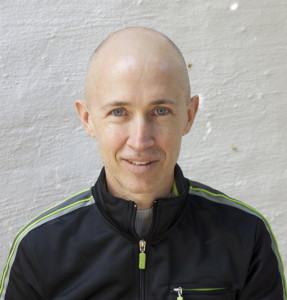 Pierre Brouard, director of the Centre for the Study of AIDS at the University of Pretoria, South Africa, is a clinical psychologist interested in sexualities, gender, human rights, and finding just the right word to grace a sentence, convey empathy or complete a crossword.
Pierre Brouard, director of the Centre for the Study of AIDS at the University of Pretoria, South Africa, is a clinical psychologist interested in sexualities, gender, human rights, and finding just the right word to grace a sentence, convey empathy or complete a crossword.
We all know the power of words. Words have the power to heal and to destroy. You have probably experienced how words can either help or hurt you.
Since this is my last [...]]]>
We all know the power of words. Words have the power to heal and to destroy. You have probably experienced how words can either help or hurt you.
Since this is my last blog for Countdown to Zero, I want to use my quota of words to reflect upon this journey that began a year and a half ago, when Countdown offered me a regular space to pen down my thoughts and my stories.
I must say the journey has been bittersweet. Delving into the past brought some sad memories.
However, I can also say that blogging taught me to be self-reflective, to take a step back and look around, inside and back. This is an exercise we can easily forget due to all the busyness of life.
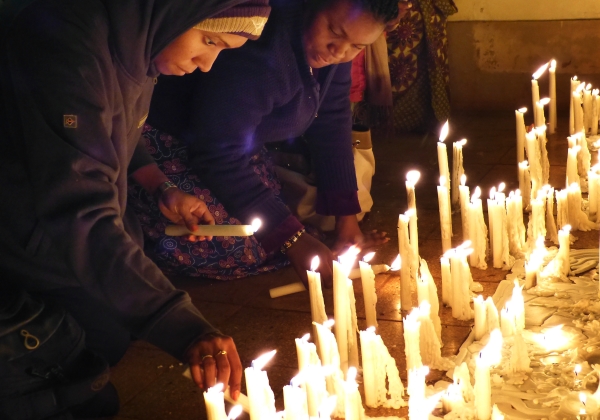
How can you make peace with everything and everyone if you have not made peace with yourself? Zandy Mqwathi reflects on her journey blogging for Countdown to Zero.
Since I don’t believe in coincidences, I choose to believe that there was a good reason why I, amidst the 6.3 million South Africans who are also living with HIV, was afforded such an opportunity.
Am I special?
Not really!
What may be special is that I have consciously opened myself up. I gathered my courage and shared my story with Countdown readers, a story which at times was neither happy nor pretty, but it is my story.
Criticism and doubts
At my church, some fellow believers who read my blogs misread my activism and my willingness to share my story and my HIV status as a lack of faith in the healing power of God.
I found myself constantly grappling with the dilemma, to tell or not to tell, to write certain things or not, because I have also publicly unveiled my love for God and my desire to live according to God’s tenets.
However, blogging evolved into something that I couldn’t have predicted. I realized that I can allow myself to be vulnerable and connect with my emotions and my past.
At times, I questioned my intentions of writing about that specific theme. Would the blog work or wouldn’t it? But things always worked out, from my very first blog on HIV positive teenagers and their challenges when dating.
I found myself glued to my laptop late at nights and over weekends, immersed in my quest to share my thoughts and stories with honesty and hoping to inspire and touch some one’s life in the process.
I hope that every time we need to deal with a difficult situation, we choose to take time to be still, to have a conversation with ourselves and our maker, and find the strength and peace we need.
May 2015 usher in a season of more connections among people and within ourselves.
Thanks, Countdown, for making this journey possible for me.
My poem
To close this blogging chapter in my life, I want to share this poem with you.
Sometimes words dishearten me
Leaving my spirit crushed
By the invincible layers that form me
How do you begin to make peace
with everything and everyone
when you still have not made peace with yourself?
At times life is complex
None of what is familiar still exists to me
Like the final curtain of a theatre stage
I am like a star that almost lost her twinkle
Truth is, Yes! I am fragile, vulnerable
just a girl trapped somewhere in between time
Can I cry now?
For all the times I chose to smile when it was hurting
For all the painful moments
that I managed to numb with distractive addictions
For all the losses
that helped me see the beauty in my life
Standing by the mirror, listening to my inner voice
reflecting back on my life and its catharsis.
With evidence that circumcision can reduce HIV risks [...]]]>
With evidence that circumcision can reduce HIV risks for men engaged in vaginal sex by up to 60%, the drive for voluntary medical male circumcision (VMMC) in adult men has taken on a new urgency. New ethical challenges are arising, beyond voluntarism and informed consent.

Circumcision is more than surgery – it is a personal, social and political marker. Our blogger unpacks meanings and impact of medical male circumcision campaigns in Africa.
How do we respect the principle of beneficence, ensuring procedures and programmes are good, not just for the person, but for society as a whole?
Non-malificence – the commitment to “first do no harm” – is crucial, and we should avoid unintentional consequences. The principle of justice should also be observed, with a focus on equity and fairness, especially when we allocate scarce resources.
Circumcision is more than just a biomedical procedure – it is a personal, social and political marker. It connotes difference or similarity. It can signify belonging to a particular religion, ethnicity, cultural group or power bloc in a country or region.
History is full of examples of circumcision being used as a tool of inclusion, exclusion and even marking for killing in times of conflict. Have we anticipated the impact of changes in identity that circumcision can signify?
Not just a cut
Not long ago I accompanied a young friend to a VMMC site in a hospital west of Pretoria, South Africa. I noticed that all the supporters of the young men in the ward (fathers, uncles, and friends) as well as the nursing staff, imbued the changed (circumcised) status of the young men with meanings around sexual prowess, transformation and rites of passage into proper masculine adulthood, away from maternal influences. For me, this suggests that VMMC is not a neutral intervention.
Current VMMC drives have failed to adequately engage with masculinity, tradition and traditional circumcision, possibly blurring intentions and outcomes.
Take the case of Swaziland, not traditionally a circumcising country. It had set ambitious targets for VMMC for HIV prevention but, by 2011, the country had only met about 12% of its target.
Against this backdrop, researcher Alfred Khehla Adams explored meanings of circumcision for Swazi men in the Kwaluseni district of Manzini.
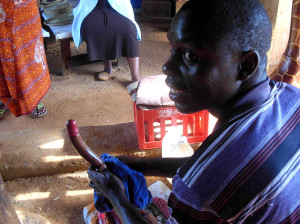
Like the Zulus, Swazi people do not practice traditional male circumcision. Research shows that Swazi men fear medical circumcision will undermine their manhood, their constructed masculinity, beyond the foreskin. Credit: Mercedes Sayagues
Men feared reduced sexual pleasure and possible adverse effects, like wounds and swelling, and said the procedure threatened their notions of manhood.
Where manhood was defined as “someone who has a wife and children” and therefore is “sexually functional”, medical circumcision introduced a threat to this.
In South Africa, traditional circumcision (with its rituals, messages and meanings) is regarded as a non-negotiable rite of passage into acceptable masculinity for some groups, perhaps precisely because there is some risk. Mutilation, amputation and death do occur.
Here, VMMC has been met with some suspicion, a reluctance to accept a clinic circumcision as an acceptable test of manhood, among concerns that “culture” is being diluted.
Given that a clinic circumcision would maximise the HIV benefits of the cutting, because sufficient foreskin is removed, VMMC campaigns have to manage this tension between a desirable health outcome (medical circumcision) and an acceptable social identity (traditional circumcision).
Objectification of black bodies
Is VMMC a form of social engineering? Because some men refuse to use a condom, believing they have sufficient HIV protection from circumcision, some women have reported more difficult condom negotiations.
On a large scale, VMMC could thus impact on gender relations, especially in contexts where gender violence and rigid masculinities dominate.
Does mass circumcision of men represent a form of biomedical pessimism, seeing men as subjects, not citizens, incapable of agency and autonomy? This pessimism says men can’t change and won’t change, and therefore we need to intervene on their behalf.
And finally, does mass circumcision of African men represent a revitalisation of the “colonial project” that views black bodies and black sexualities in a particular way?
In South Africa, the apartheid state and parastatals such as the mines constructed medical machinery which viewed male bodies as objects to be medically managed and controlled, while at the same time the reproductive rights of black South Africans were limited through contraceptive programmes.
It would be naive, I believe, to ignore this history of objectification, and broader ethical debates, as donor money is used to save African men from themselves.
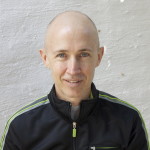 Pierre Brouard, director of the Centre for the Study of AIDS at the University of Pretoria, South Africa, is a clinical psychologist interested in sexualities, gender, human rights, and finding just the right word to grace a sentence, convey empathy or complete a crossword.
Pierre Brouard, director of the Centre for the Study of AIDS at the University of Pretoria, South Africa, is a clinical psychologist interested in sexualities, gender, human rights, and finding just the right word to grace a sentence, convey empathy or complete a crossword.
Life has thrown me so many stones that I thought I would collapse under the heap.
In my early teens, I was uncontrollable. The boys and men I had sex with never stayed. The alcohol disappeared and I would sink deeper in despair. I didn’t bother about who touched me where – I was a girl for public use.
Before you judge me, listen to my story. I am one of so many girls acting in a self-harming way because of a horrible beginning in life.
From the age of six, I was sexually abused by young uncles. Incest did not exist in my world in Kabarole, in rural Uganda, and later in Kampala, the capital. Sex was a way of life, not a way of giving pleasure, love and respect.
When I reached puberty, I just went on having sex with anyone. I did not think of unwanted pregnancies, sexually transmitted diseases and HIV. I didn’t know about these things.
Worse, I shut my ears to the few health education programs available in the early 2000s.
I got pregnant at age 15. I didn’t have a clue that a baby was growing inside of me. Someone who noticed told my family. Protecting the family name, they took me to hospital and the pregnancy was terminated.
Word got around in my boarding school. Nobody talked to me. My friends abandoned me. School became hell. To be expelled, I burnt my mattress.
Out of school, I was wild and reckless. In 2008, I got pregnant again. My boyfriend left me the moment I told him I was pregnant and had tested HIV-positive during the first antenatal care visit.
I was put on antiretrovirals (ARVs) and my beautiful baby girl was born HIV negative. But I didn’t follow the instructions of exclusive breastfeeding for six
months. I had little milk and no money for food for her or for me. She acquired HIV, nearly died and started ARVs when she was eight months old.
I am happy to say she is now a healthy, bouncy five years old.
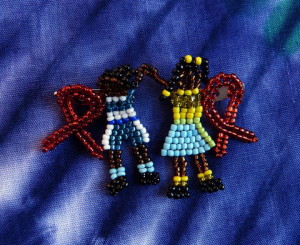
Adolescence is a turbulent time and young people need guidance to navigate it safely, says our blogger, herself a survivor of teen turmoil, who now counsels youth about HIV and unwanted pregnancies.
Turn around
This was the turning point in my life. I wanted to, I needed to live differently.
I looked around and saw so many young people getting infected, feeling miserable and dying. AIDS is the biggest killer of teenagers in Africa today.
I thought: who knows how many have gone through a hard childhood like me? I can use my experience to warn young people about AIDS and unwanted pregnancy. And for those who already live with HIV, I can help them live positively.
I can give the one thing I never had: someone to talk to, someone to guide me. A red light telling me to stop.
I have seen the impact my story has on young people every time I share it. Young people can relate to me, to my hard life. And I can relate to their daily doubts and struggles.
Sometimes I see my uncles. I have not confronted them. I have forgiven them; I can’t dwell too much on the past. I have to let go or I won’t be able to move on with life.
I believe that everything happens for a reason. My painful past was an on-the-job training so today I can help young people live healthily and safely in the times of HIV.
 Barbara Kemigisa is an HIV/family planning campaigner who lives positively with HIV in Uganda. When she is not campaigning, she dabbles in fashion design, plays guitar, composes and sings R&B songs about living with HIV with the same passion she puts in her work towards zero new infections.
Barbara Kemigisa is an HIV/family planning campaigner who lives positively with HIV in Uganda. When she is not campaigning, she dabbles in fashion design, plays guitar, composes and sings R&B songs about living with HIV with the same passion she puts in her work towards zero new infections.
Like everybody else, I follow Ebola in the news.
And I can’t help but notice the similarities of the world’s reaction to Ebola today and to AIDS 30 years ago.
When AIDS first appeared in the early 1980s, scientists explained that the disease was transmitted primarily by sex, blood transfusions, and [...]]]>
By Claire Gasamagera
Like everybody else, I follow Ebola in the news.
And I can’t help but notice the similarities of the world’s reaction to Ebola today and to AIDS 30 years ago.
When AIDS first appeared in the early 1980s, scientists explained that the disease was transmitted primarily by sex, blood transfusions, and shared needles.
But, in fear of the deadly disease, many were quick to blame gay men, sex workers, Haitians and Africans. Some suggested that AIDS was God’s punishment for sinful sexual behaviors.
In the first decade of AIDS, we let ignorance, indifference, hate, stigma and discrimination guide us. We missed the point. World action started late, and we lost millions of people to AIDS.
Finally, in the 1990s, it became obvious that HIV and AIDS could affect married couples, pastors, sport stars, hemophiliacs, rape survivors and children. Children like me.
I belong to the first ever generation of children born with HIV. As a child, I was very thin and my classmates called me names, like “skeleton” and “AIDS”. I would go home and tell my Dad. He would comfort me, saying: “You can’t have AIDS, it’s for older people, you are just a kid, you are my little queen.” He would kiss me and hug me and make me forget the bullying.
Blame-and-shame hurts
I became an activist when I was 18 years old. I didn’t and still don’t like the AIDS image in people’s minds. Some quickly ask: “How did you get it?” When I say I was born with HIV, they keep asking: “Who brought HIV into your family?” and often jump to conclusions, like “Men are unfaithful”, suggesting my Dad was a bad guy.
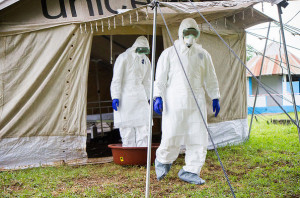
Health workers rinse their feet in bleach when leaving a tent for Ebola patients. Our blogger says the world should rinse out its prejudice and not repeat the same mistakes made with AIDS 30 years ago.
My Dad wasn’t a bad guy! He was infected and affected by HIV and the world didn’t assist him much. Instead they judged him and called him names. As I look back, I realize all he went through, raising me as a single father when my Mum died, burdened with guilt and guided by love, convincing me to take medication and answering my questions. He died painfully from AIDS 17 years ago and I still miss him.
One day, at an AIDS conference in Rwanda, I met a distant aunt. She started describing my Dad as an evil man who had infected my Mum and me with HIV. With tears in my eyes, I refused to listen.
It hurts when people fail to understand the pain my Dad went through and to acknowledge that he raised me lovingly and gave me everything I have now, from my name to my education.
With Ebola, some are acting like my aunt, stigmatizing Ebola sufferers, survivors and carers.
We can’t fight an epidemic by ostracizing affected communities. We can only win if we let science and compassion guide our interventions.
The Ebola epidemic is proving that the world hasn’t changed much. We are quick to stigmatize, discriminate and criminalize affected communities.
African boys are bullied and called Ebola at American schools, volunteer health staff saving lives in West Africa is unreasonably quarantined in the USA, and visa and travel bans punish citizens from Ebola-affected countries. Do people really think they can create a safe haven by shutting out others?
Stigma, discrimination, travel bans and prejudice won’t solve Ebola.
Instead, we should unite against the HIV and Ebola viruses. We can do more, and better.
“The AIDS disease is caused by the HIV virus but the AIDS epidemic is caused by HIV and AIDS- related hate, indifference, stigma and discrimination and criminalization,” said singer Elton John.
The same applies to Ebola. Let’s not fall into Ebola’s trap. We can’t afford to lose more people by ignoring science and conceding to bigotry and stigma.
 Claire Gasamagera is an HIV activist from Rwanda, with a degree in food technology and a passion for defending the rights, health and dignity of young people living with HIV. She is the founder of Kigali Hope Association, which later became Rwanda Young Positives. She is a board member of the International Community of Women Living with HIV in North America.
Claire Gasamagera is an HIV activist from Rwanda, with a degree in food technology and a passion for defending the rights, health and dignity of young people living with HIV. She is the founder of Kigali Hope Association, which later became Rwanda Young Positives. She is a board member of the International Community of Women Living with HIV in North America.
After the dialogue, two young women approached me. One said that a good friend had recently disclosed her HIV positive status, and she wondered what to do, how to help.
[...]]]>After the dialogue, two young women approached me. One said that a good friend had recently disclosed her HIV positive status, and she wondered what to do, how to help.
This is what I told her, based on my experience as a young woman living with HIV.
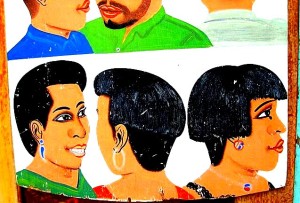
What can you say and do when a friend confides she is HIV
positive? First, listen with an open heart, says our blogger Zandy Mqwathi, drawing from her own experience. Credit: Mercedes Sayagues
Three things to do:
1. Listen. It sounds simple but sometimes one just needs to be heard. There is tremendous healing power in telling our stories of battling with chronic disease or the death of a loved one. It might be the most powerful medicine on earth for the story-teller.
2. Allow the teller to be vulnerable. The gateway to intimacy is being vulnerable about your imperfections. Watch a great Ted Talk by Brené Brown on the power of vulnerability.
3. Offer support. You might be the only person that they can be open with. You can help by reminding them to take their pills on time or just offering to listen, anytime.
Three things to avoid:
1. Do not make a disappearing act, and don’t start treating them as if they have some special condition. We are the same person, with or without the virus.
2. Do not take on a counsellor’s role. Leave this to trained counsellors, who are able to deal with the pressures and emotional demands it involves. Taking on this responsibility might drain your energy and discourage you from helping others in the future.
3. Don’t go overboard. Do not offer to do things that may place a huge burden on you, such as taking your friend to the clinic regularly. This could make you resentful and spoil your friendship. If you make a commitment and it becomes too heavy, tell your friend. Be open and honest.
My experience of disclosing
My older cousin was among the first people I told about my HIV+. I was 23 years old, back in 2007, a new mother, diagnosed four months earlier, and she was in her mid-thirties.
I remember warmly how she made me feel I was the same person, with or without HIV. She made me understand that I did not have to act differently, that my status was an internal issue rather than external, and that I first had to deal with my emotional well-being.
If and when I accepted that I am HIV positive for the rest of my life, I would have won the battle against self stigma and self-discrimination.
This acceptance has been a continuous process in my life. And, yes, not everyone I disclosed to was as welcoming, non-judgemental or supportive as I would have wished. But my cousin set me on the right path with her wise words, and you can do the same for your friends.
And remember, kindness comes round. The more we give, the more we receive.
Zandi “Princess Zar” Mqwathi is a confident, innovative young leader and a former radio personality with a zeal and drive to use her craft and experiences to educate and empower other young women. ]]>Y+ Beauty Pageant, a first for young men and women living with HIV in Uganda, took place at the elegant Golf Course Hotel. It was organized by my group, the Uganda Network of Young [...]]]>
Y+ Beauty Pageant, a first for young men and women living with HIV in Uganda, took place at the elegant Golf Course Hotel. It was organized by my group, the Uganda Network of Young People Living with HIV & AIDS, under the slogan Beauty with Zero Discrimination,
In my country, to proudly get on stage, show your face and display your name when you are HIV positive is, believe me, a daunting task. I live with HIV and I can tell you it is hard.
However, you’d never know this from the contestants’ smiling faces. Youthful, healthy and gorgeous, they walked proudly in immaculately tailored suits and stylish dresses.
Their stories were inspirational.
One contestant said: “I used to get sick as a child when I didn’t take my medication, but now you can see I take it well and am very healthy now.”
Sharifah Nalugo Kyomukama recalled when classmates at university discovered her ARV pills. She decided to disclose her HIV+ status, only to be met with a rash of discrimination. She broke down in tears as she recounted her experience: “Discrimination hurts and it is never okay.”
Fifty contestants, aged 16 to 25, rehearsed with the help of experts during two days for the talent and fashion shows, and 10 finalists were selected.
In the talent portion, they sang, danced, recited poems and monologues about what being HIV positive means to them. Many emphasized the importance of taking medication regularly and engaging in safe sex.
Sex is good
The glitzy event was attended by top leaders from Uganda’s HIV community and local celebrities who came on stage to sing, speak and advocate.
We even had commercial sponsors who were not afraid to be associated to an HIV event, which was broadcast on six TV stations and five radios.
When Uganda’s former vice-president, Dr. Speciosa Wandira-Kazibwe, walked on stage, she was a ball of fire. “You are all beautiful and handsome!” she cheered.
Wild clapping ensued when she told participants there is no shame in their sexuality.
“Sex is the most pleasurable thing you can ever have,” she said. She described her own battle promoting condoms, when churches, mother’s unions and newspapers castigated her for allegedly promoting promiscuity.
However, obstacles and criticism have never deterred this fiery woman. Waving a string of colorful condoms, she happily danced with the contestants.
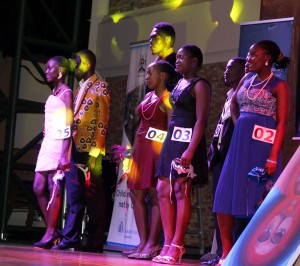
Proudly positive: finalists at the Beauty with Zero Discrimination
pageant for young Ugandans living with HIV
Professor Vinand Nantulya, chairman of the Ugandan AIDS Commission, spoke angrily against the recently passed HIV Control and Prevention Act.
“Criminalizing HIV and AIDS is wrong, unacceptable and nonsensical,” he told the crowd. “We will not let them get away with it.”
The winners, Sharifah Nalugo Kyomukama, 19, and Ronald Juan Kaganda, 20, were crowned Mr. and Miss Y+ (Youth HIV Positive). They will work as ambassadors in a new HIV prevention campaign.
Sharifah, her tears forgotten, beamed as she received the award. Later, the crowd enjoyed revelry and dancing. We had a blast!
The Y+ Beauty Pageant will be back next year – a public platform where HIV+ youth in Uganda can fight stigma and discrimination and celebrate their lives.
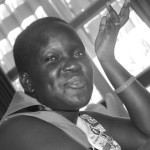 Jacquelyne Alesi is a wife, mother, daughter, HIV activist and Programme Director at the Uganda Network of Young People Living with HIV/AIDS, an organization that since 2003 works to improve the quality of life for HIV-positive youth in Uganda.
Jacquelyne Alesi is a wife, mother, daughter, HIV activist and Programme Director at the Uganda Network of Young People Living with HIV/AIDS, an organization that since 2003 works to improve the quality of life for HIV-positive youth in Uganda.


